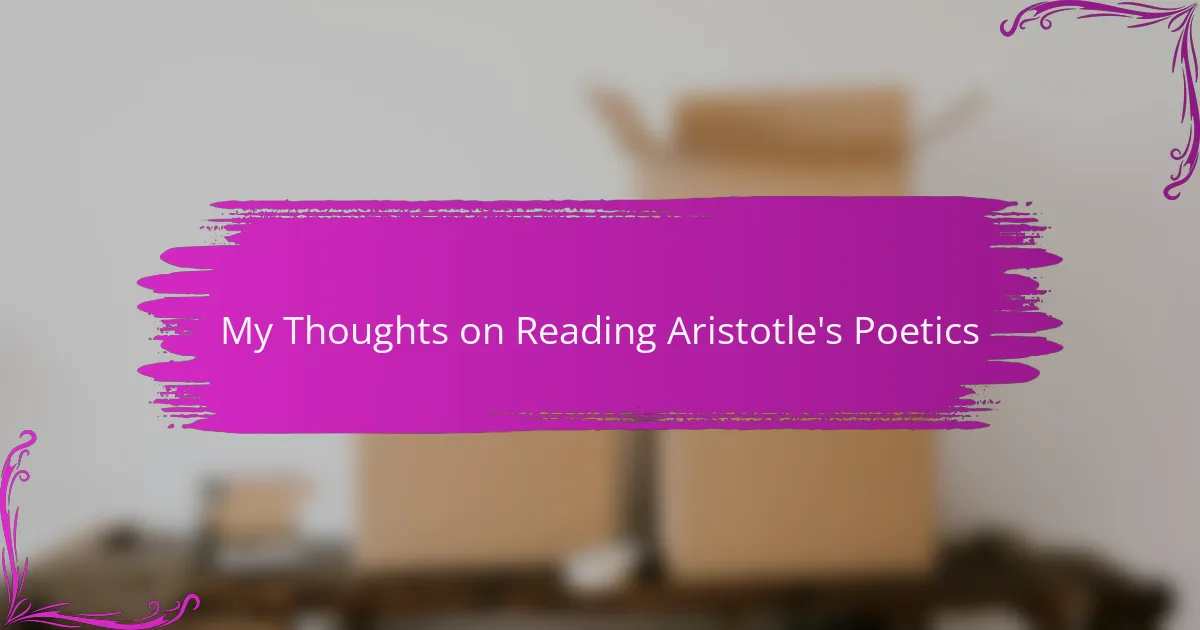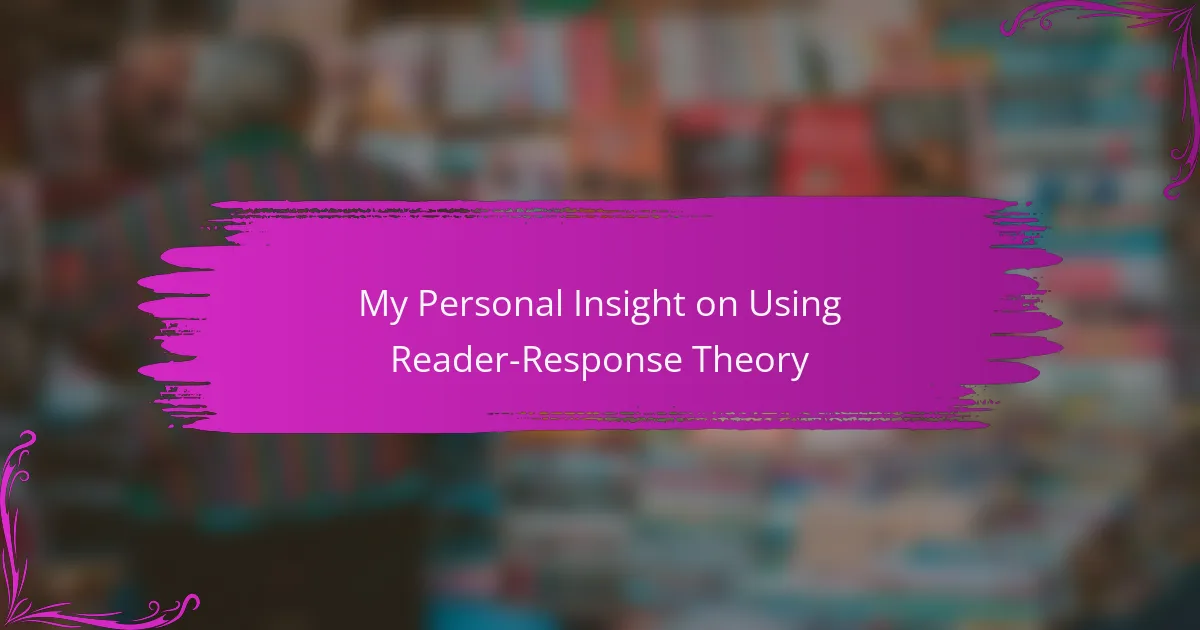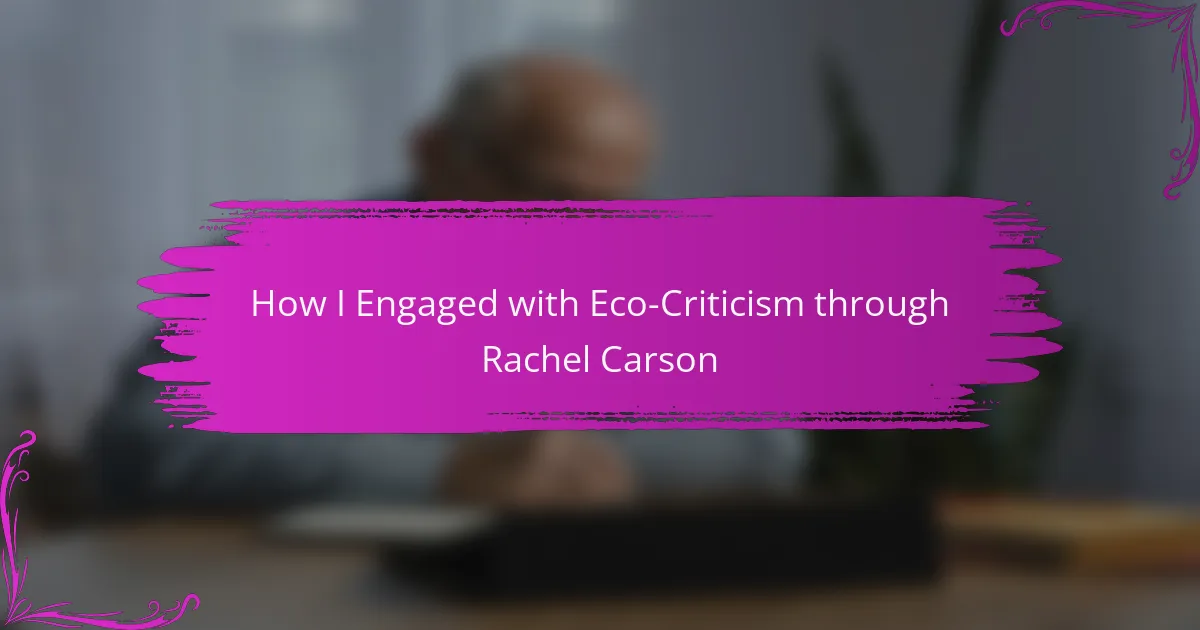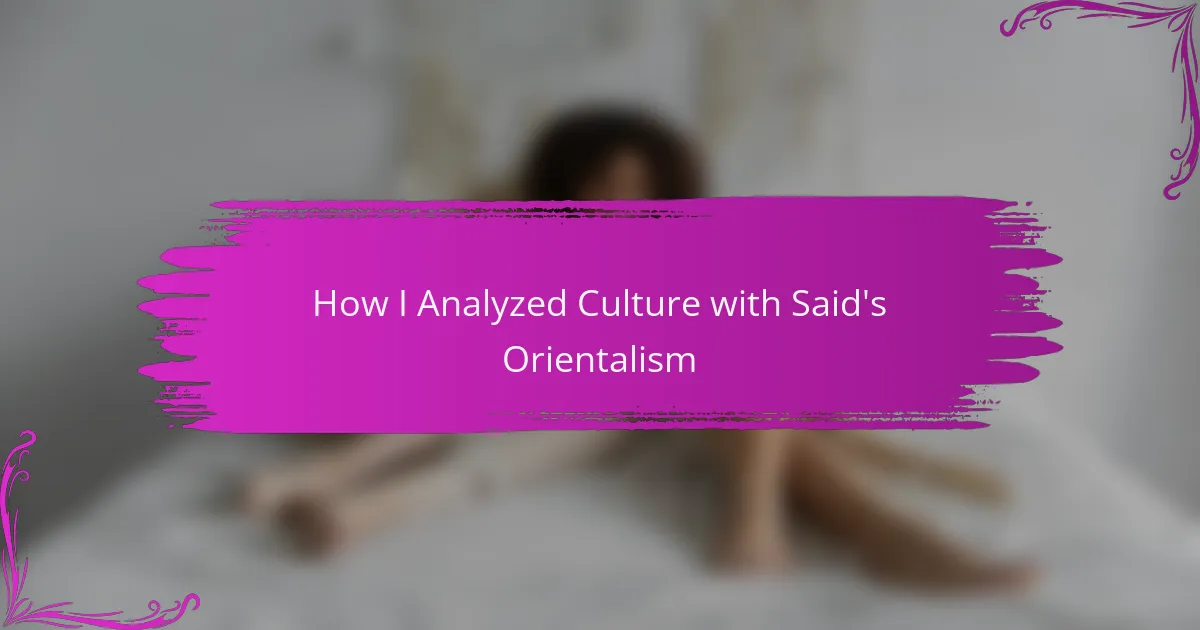Key takeaways
- Aristotle’s Poetics emphasizes the unity and purpose in storytelling, encouraging every element to contribute to the narrative as a whole.
- The themes of catharsis and mimesis highlight the emotional engagement and connection between art and life, enhancing the reader’s experience.
- Literature education fosters critical thinking and empathy, allowing individuals to explore diverse perspectives and deepen their appreciation for stories.
- Practical applications of Aristotle’s principles in writing include focusing on character development, engaging plot structures, and evoking themes that resonate with human experiences.
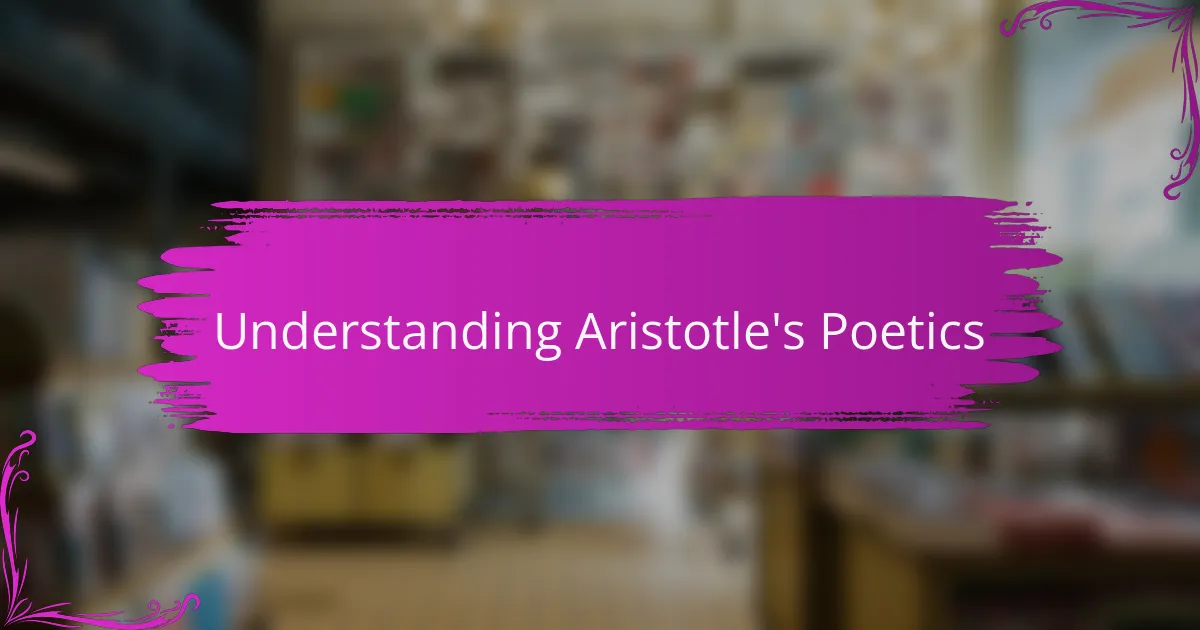
Understanding Aristotle’s Poetics
Aristotle’s Poetics dives deep into the mechanics of storytelling, and I find it fascinating how his ideas shape our understanding of literature even today. I remember the first time I read it; I was struck by his exploration of tragedy and catharsis. Who would have thought that a text over two thousand years old could resonate so profoundly with modern audiences?
As I delved into his discussion on plot structure, it struck me that Aristotle’s emphasis on unity and purpose in storytelling is something we often overlook in contemporary writing. He argues that every element should contribute to the whole, much like how each scene in a movie builds toward a climax. Isn’t it remarkable how this principle can guide both writers and readers in appreciating the intricacies of a narrative?
Moreover, Aristotle’s classification of different genres provides a lens through which we can analyze works of literature critically. I often find myself reflecting on how these classifications influence our emotional reactions while reading or watching a play. Have you ever paused during a story and thought about why it invokes a particular feeling? Understanding his perspective can certainly enhance our engagement with various texts.
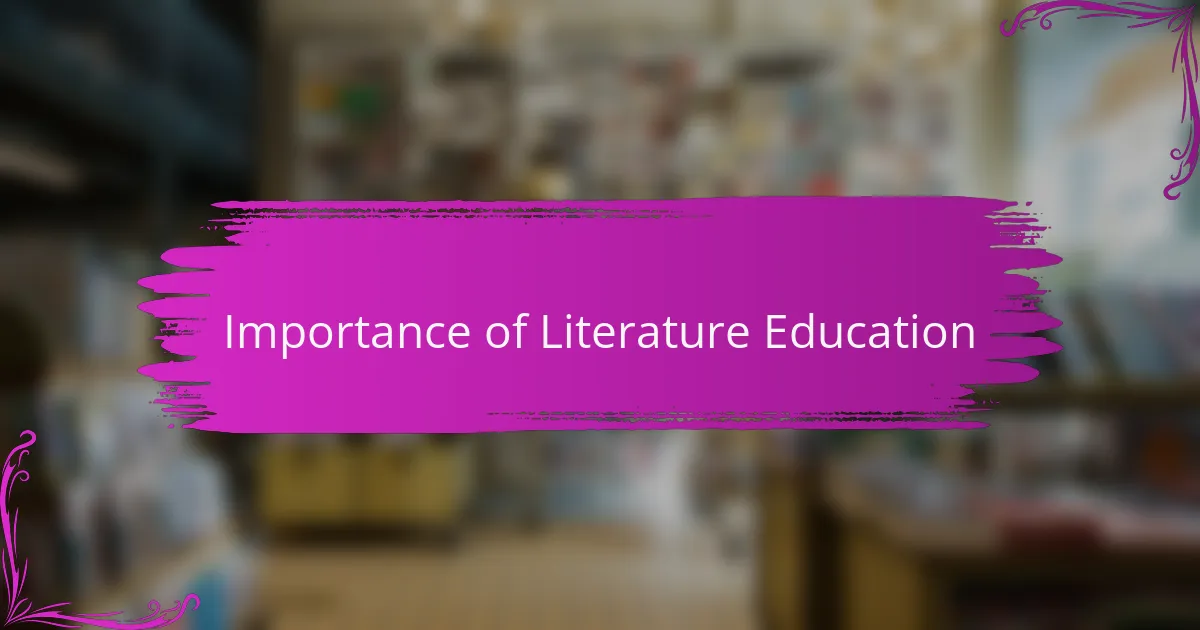
Importance of Literature Education
Literature education plays a crucial role in understanding not just stories but the human experience itself. It fosters critical thinking and empathy, allowing us to engage with diverse perspectives. I remember the thrill I felt when reading Aristotle’s Poetics; it opened my eyes to the mechanics behind storytelling and the deeper meanings within texts.
Through literature, we learn fundamental themes such as love, conflict, and the struggle for identity, reflecting our own lives and the world around us. I often find myself relating Aristotle’s ideas to contemporary works, enriching my appreciation for both classics and modern narratives. This connection underscores the timeless relevance of studying literature.
| Aspect | Explanation |
|---|---|
| Critical Thinking | Literature encourages analyzing and interpreting texts, leading to deeper understanding. |
| Empathy Development | Reading diverse stories helps students relate to various cultures and experiences. |
| Communication Skills | Literature educates students on effective expression and comprehension through rich language. |
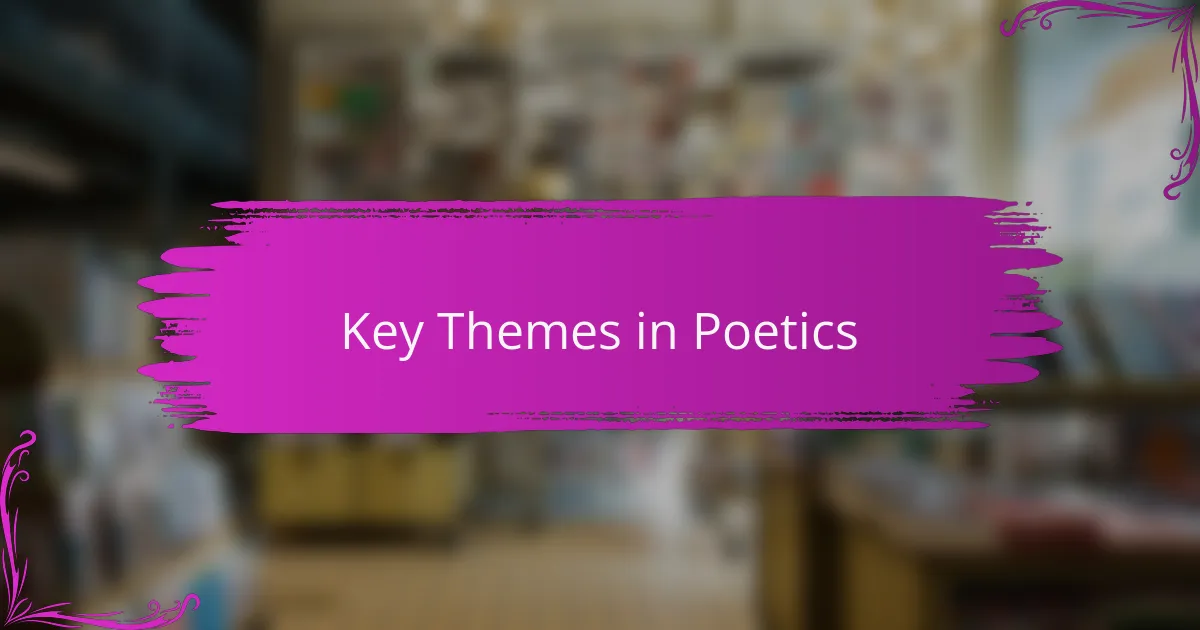
Key Themes in Poetics
In my exploration of Aristotle’s Poetics, I found that one of the key themes is the concept of catharsis. This idea refers to the emotional purification we experience as an audience when we engage with tragedy. I distinctly remember feeling a mix of sadness and relief during a powerful performance of Oedipus Rex. It was astonishing how a story could evoke such deep feelings and yet leave me feeling cleansed afterward.
Another prominent theme in Poetics is the importance of mimesis, or imitation. Aristotle suggests that art is an imitation of life, which resonated with my own journey as a writer. I often reflect on how my personal experiences influence my storytelling. By drawing from real emotions and events, I aim to create a narrative that feels authentic.
- Catharsis: Emotional release through the audience’s engagement with tragedy.
- Mimesis: Art as an imitation of life, emphasizing the connection between reality and storytelling.
- Structure of Tragedy: Elements like plot, character, and spectacle, which Aristotle defines as crucial to effective storytelling.
- Unity of Action: The idea that a tragedy should revolve around a single, cohesive storyline.
- Character Development: The importance of a protagonist who undergoes significant change, allowing the audience to relate to their journey.
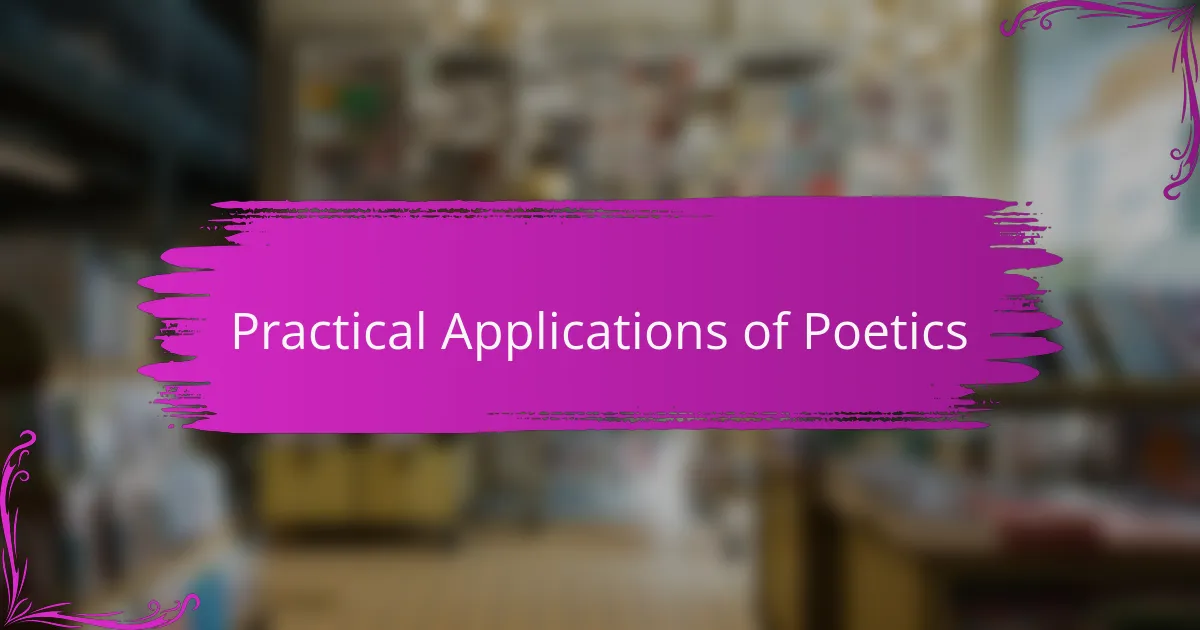
Practical Applications of Poetics
Reading Aristotle’s “Poetics” has profoundly influenced my understanding of storytelling and drama. The principles he laid out, like the concept of catharsis, resonate deeply with me. I remember the first time I encountered that idea; it illuminated my own writing process, highlighting how important emotional release is in crafting a compelling narrative.
When I apply Aristotle’s ideas in my own work or when coaching writers, I often refer to specific techniques derived from “Poetics.” Here are some practical applications that enhance both writing and understanding of literature:
- Focus on character development to create relatable and complex protagonists.
- Use plot structure techniques, such as the setup, conflict, and resolution, to build engaging stories.
- Implement themes that resonate with human experiences for deeper emotional connections.
- Experiment with dramatic irony to create suspense and engage the audience.
- Encourage readers to find catharsis through personal reflection and connection to the work.
These insights have not only shaped my own writing but have also provided a framework for discussing literature with others. The emotions evoked can transform the reading experience into something truly meaningful.
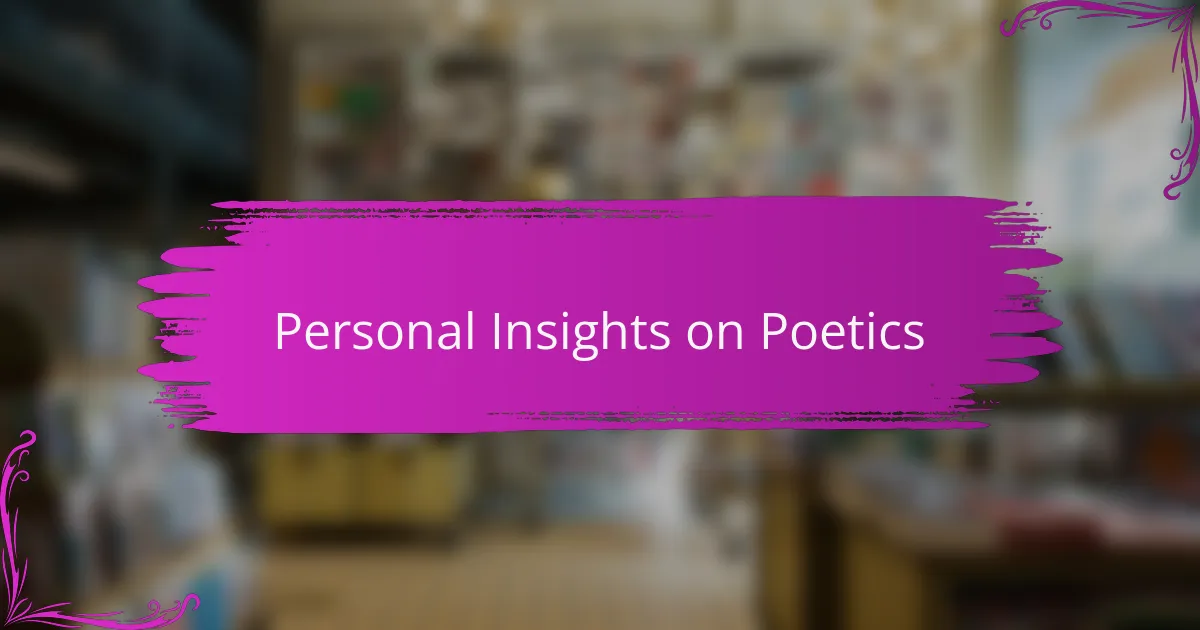
Personal Insights on Poetics
Diving into Aristotle’s Poetics was like opening a door to a new world for me. I remember sitting in a quiet café, and as I read his thoughts on tragedy and catharsis, I felt an emotional connection that made the concepts come alive. The way he explained the purpose of tragedy pushed me to reflect on the stories I cherish most, realizing how they evoke profound feelings and teach us about our own humanity.
Aristotle’s insights on the structure of drama are timeless. They not only apply to ancient works but also resonate with modern storytelling. Here are some points that stood out to me while reflecting on his ideas:
- Unity of Plot: Aristotle emphasizes that a cohesive plot is essential, reminding me of why some stories linger in our minds while others fade away.
- Character Development: His focus on credible characters made me reconsider the importance of depth in the people we create in our own narratives.
- Catharsis: Understanding the term “catharsis” illuminated why I often seek certain books or films during emotional moments—they provide a release and clarity.
- Mimesis: Aristotle’s concept of imitation as a form of learning challenges my view of creativity; I now see how we are all part of a larger storytelling tradition.
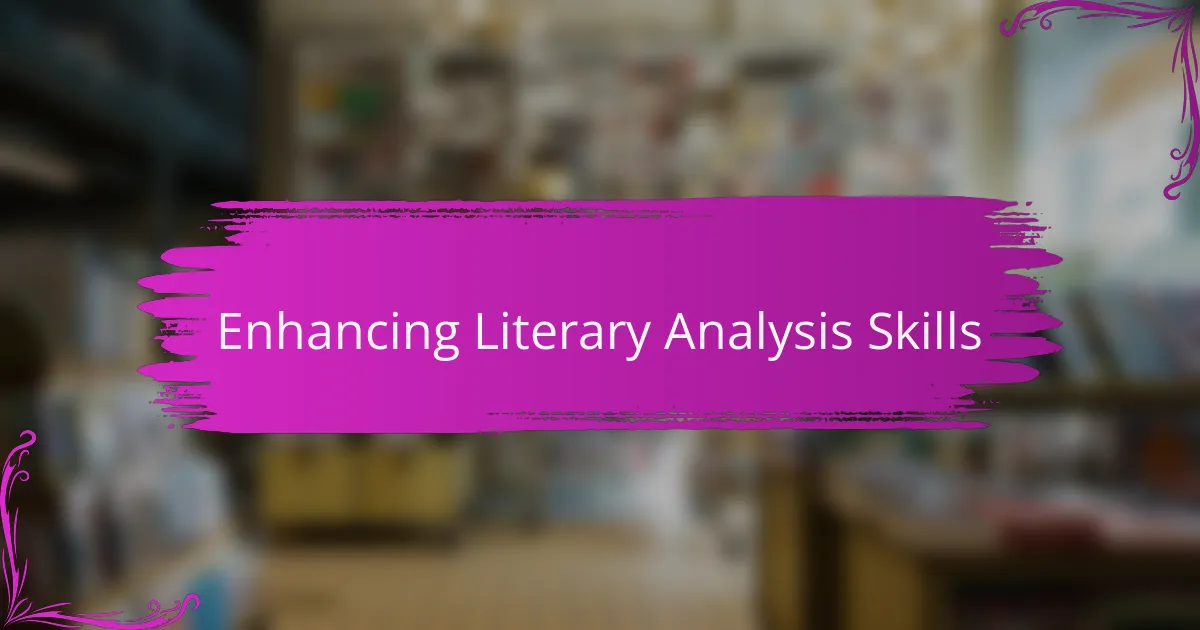
Enhancing Literary Analysis Skills
There’s something magical about diving into the intricacies of literary analysis, especially when using Aristotle’s Poetics as a guide. I often find that his concepts encourage me to look beyond just the story and examine the underlying structures that shape our reading experience. For instance, when I analyze a piece of literature, I ask myself how the plot elements intertwine. It’s fascinating to discover how a seemingly minor detail can lead to a critical turning point in the narrative.
Engaging with Aristotle’s ideas also enhances my ability to articulate thoughts about a text. When I discuss stories with friends or colleagues, I draw on his emphasis on character and plot unity. I remember a lively conversation about a contemporary novel where we dissected the protagonist’s journey, and I found myself advocating for Aristotle’s principle of coherence. This not only deepened our discussion but also shed light on what makes a character relatable and real.
It’s inspiring how Aristotle encourages us to embrace empathy in literary analysis. I often reflect on how understanding the emotions behind characters can lead to richer discussions about their choices and struggles. Have you ever read a book and felt compelled to analyze why a character acted a certain way? By applying Aristotle’s framework, I’ve found that my insights become more profound and impactful, allowing me to connect more passionately with the material.
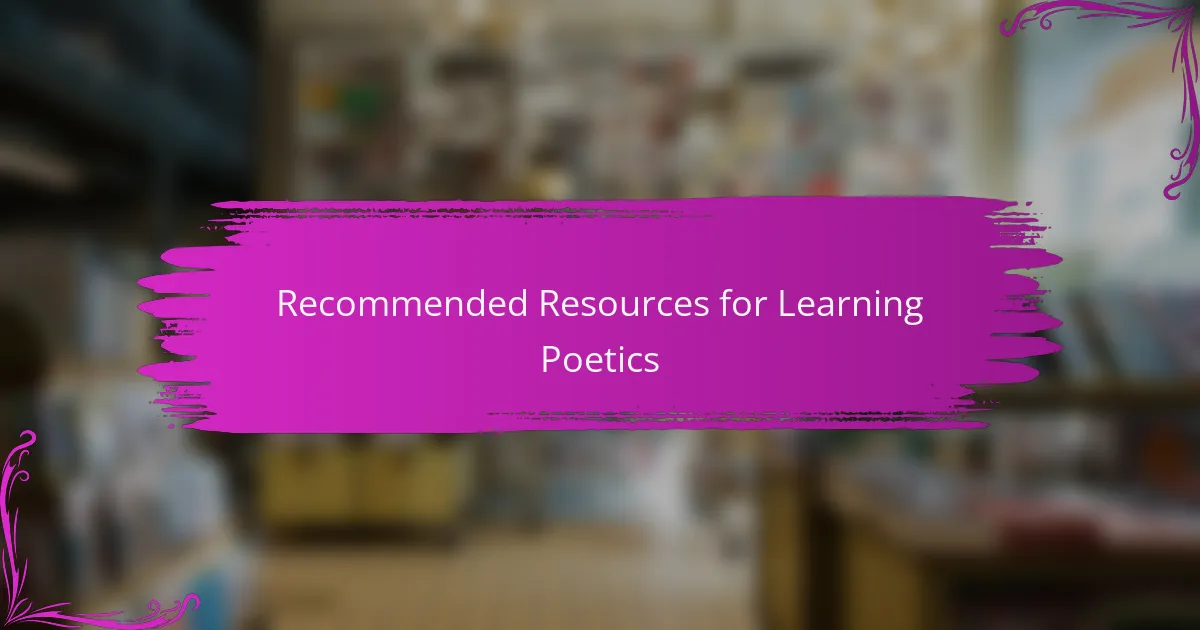
Recommended Resources for Learning Poetics
When it comes to exploring Aristotle’s Poetics, I highly recommend starting with accessible translations. I remember the difference it made when I found a version that not only kept the essence of his thoughts but also clarified complex ideas. Look for annotations or companion texts that provide context and explanations; these can truly enhance your understanding. Have you ever felt lost in a classic text? Trust me, having a good guide can be a game changer.
Additionally, secondary literature is invaluable for deepening your insights. I found that reading commentaries and analyses of Poetics opened my eyes to different interpretations. Some authors offer modern parallels that relate Aristotle’s concepts to contemporary storytelling, making them easier to grasp. It’s almost like having a discussion with someone who’s already threaded those lines for you. Has any particular analysis ever reshaped your view of a familiar piece?
Finally, engaging with online courses or lectures about Aristotle’s ideas can provide a dynamic way to learn. There’s something about hearing passionate educators discuss Poetics that brings the material to life. I vividly recall an online seminar where the facilitator posed questions that sparked lively debates among participants. It reminded me how collaborative learning can expose us to new ways of thinking. Have you considered participating in a course or discussion group, perhaps to share your own reflections on the text?
